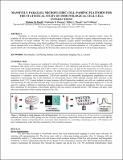Massively Parallel Microfluidic Cell-Pairing Platform for the Statistical Study of Immunological Cell-Cell Interactions
Author(s)
Hoehl, Melanie Margarete; Dougan, Stephanie K.; Ploegh, Hidde; Voldman, Joel
DownloadMHoehl_MicroTASpaperv8.pdf (1.705Mb)
OPEN_ACCESS_POLICY
Open Access Policy
Creative Commons Attribution-Noncommercial-Share Alike
Terms of use
Metadata
Show full item recordAbstract
Variability in cell-cell interactions is ubiquitous and particularly relevant for the immune system, where the reliability of cell-cell interactions is critical for the prevention of disease. This variability is poorly understood mainly due to the limitations of current methods. We have therefore designed a highly parallel microfluidic cell-pairing device and optimized its pairing efficiency using fluids modeling. The optimized device can hydrodynamically pair hundreds of primary mouse immune-cells at an efficiency of ~50%. We measured T cell activation dynamics of ~130 primary mouse T cells paired with B cells. Our findings represent the first time that variation has been observed in T cell activation dynamics.
Date issued
2011-10Department
Harvard University--MIT Division of Health Sciences and Technology; Massachusetts Institute of Technology. Department of Biology; Massachusetts Institute of Technology. Department of Electrical Engineering and Computer Science; Whitehead Institute for Biomedical ResearchJournal
Proceedings of the 15th International Conference on Miniaturized Systems for Chemistry and Life Sciences, MicroTAS 2011
Publisher
Chemical and Biological Microsystems Society
Citation
Hoehl, Melanie, Stephanie K. Dougan, Hidde L. Ploegh, and Joel Voldman. "Massively Parallel Microfluidic Cell-Pairing Platform for the Statistical Study of Immunological Cell-Cell Interactions." In 15th International Conference on Miniaturized Systems for Chemistry and Life Sciences, October 2-6, 2011, Seattle, Washington, USA.
Version: Author's final manuscript
ISBN
9781618395955